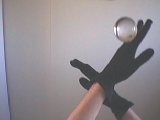
| main LOGIN main register ~ CJC 2025 ~ |
| resources workshops essays FAQ links moves referers tshirts videos |
 |
Workshop page 3 (of 3)
And now for the butterfly
The butterfly has been named after a similar hand movement in a Middle Eastern
Dance
[ source: Contact Juggling by James Ernest]
. It is the most well known move in Contact Juggling. Many people see it as a
'signature-move' from Mr. Michael Motion (a prominent Contact Juggler, you can
read a short bio about him on
this page
). Which is why the book of J.Ernest has a somewhat controversial reputation,
since the move is described in it, in fine detail. I hereby hope that this
workshop will not get the same bad publicity.
( NOTE: a couple of years back there was an extensive discussion on this
matter, on whether or not it is illegal or immoral to copy some bodies moves,
on the rec.juggling newsgroup. Perhaps somebody would like to write an essay on
the subject and place it somewhere on these pages. You can search the old
rec.juggling mail in the
JIS-archive
)
Okay, sorry, I seem to have strayed from the subject somewhat, back to the
workshop.
The Butterfly is performed in two different ways. The first is an extension of
the windshield wiper and requires you to learn the back-to-back transfer. The
second also uses the back-to-back transfer but also makes use of new kind of
cradle and is made in front of your body (the hands don't reach out more than
shoulder width).
The two paragraphs below will explain them in that order
First without a ball. Place your hand in the home position, but instead of holding the hand straight in front of your chest, you hold your hand almost in front of the shoulder of your other arm. Mirror this position with your other arm/hand, so that the wrists of both hands touch in front of your chest. Now do the windshield wiper simultaneously with both arms. From the home position to the outside hold and back.
![[practice the butterfly motion]](images/dry_butterfly.jpg)
|
There is one major difference between the windshieldwiper and the butterfly; In the windshieldwiper you try to keep your elbow in one position, the upper arm rotates around that like a ... well, a windshield wiper. The butterfly motion on the other hand greatly improves if you use your elbow to lead the arm in its path (this results in the figure eight pattern I told you about in chapter 2). So starting in the butterfly home position you would start by moving your elbows sideways, then (elbows continue to go outwards) you'd rotate your upper arms towards the outside hold. The same applies from outside to inside; let your elbows start the movement by going first. A small step forwards; imagine a ball. Start with the above described butterfly home position, ball lies on the hand furthest away from your body in the cradle. Do the butterfly (both arms simultanious), to outside en back. Coming back to the home position you should switch your hands; the hand which was furthest away in the start position (holding the ball) now has the inside position. (as I do in the Animation) |
As soon as the wrists are touching again you let the ball roll from the cradle
onto back of your hand, onto the back of the front hand and through into the
cradle of your front hand. (and yes, this is called the Back-2-Back transfer)
The advantage of this switching of hands is that the ball always rolls away
from you into the other cradle. And thus you have less chance that your empty
hand blocks the view of your audience.
Now you're in the (mirrored) start position and you can repeat the whole thing.
![[the Circle]](images/circle2.jpg)
|
Before you try all the above with a ball, you should first learn the back to
back transfer.
|
![[incooperate it all in one move: the butterfly]](images/butterfly.jpg)
|
I use the easy back-2-back (not extending it over
both
the backs of my hands). That means that I don't reach the 'wrist touches
wrist' position which is the butterfly home position. And I have a problem with
my arms; the left (viewers right) arm makes the butterfly somewhat higher,
which makes the pattern a bit lopsided.
|
|
The second butterfly is done with a two finger cradle. Put your hand in the
home position. But now instead of lowering your your middle finger you make a
'peace sign' with the index and middle finger. The ball can now be placed on
the index- and middle finger, kept in position with the first and second finger
joints. You can now use this two finger cradle as a start to the windshield
wiper, but that move looks nicer when you use the longer roll over the middle
finger.
|
![[The two finger cradle]](images/two-finger_cradle_small.jpg)
|

|
Instead of letting your arm make a big, long sweep, you can also keep your arms
more in front of your body and only make the cradle to palm and back roll, by
twisting your wrist.
|
You can follow this link back to the second workshop page.
Or press here to go back to the first workshop page.